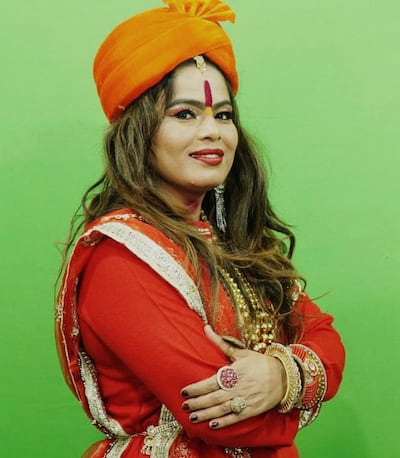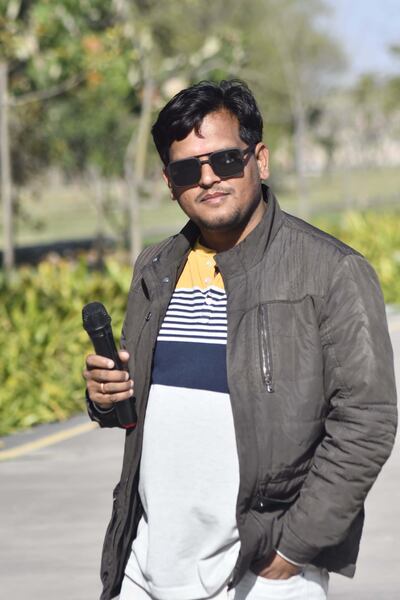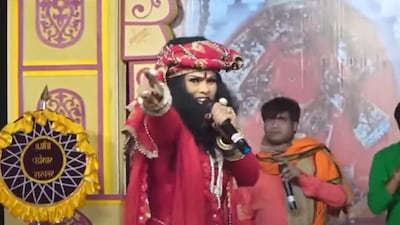Wearing an ornate turban and a saffron dress, vermilion powder smeared on her forehead, Laxmi Dubey prods her listeners on YouTube to press the “lotus” button on voting machines to re-elect Prime Minister Narendra Modi, whom she calls the “Lion of India”.
She then sings, “Every child in the country will sing Modi, Modi.”
The song has garnered tens of thousands of views within just three weeks of its release on Dubey's YouTube channel, which has about half a million subscribers.
“Governments come and go but the reason to support Modi and his Bharatiya Janata Party (BJP) is that only they have embraced saffron,” she told The National. “It is our duty as a Hindu to support him.”
The colour saffron, long associated with Hinduism, has been adopted by Hindu nationalists as a symbol of their growing influence in the past 10 years of BJP rule.
“Because of Mr Modi, Lord Ram found his house,” she said, referring to a grand temple dedicated to Hindu deity Ram that is being built on the site of a 16th-century mosque razed by a Hindu mob in 1992.

Dubey, 30, is one of the stars of a booming music genre known as “H-pop” – Hindutva pop – songs with hypnotic beats inspired by electronic dance music and incendiary lyrics that promote Hindu supremacy and anti-Muslim bias.
Hindutva, which has been likened to white supremacy, is an ideology that claims primacy for Hinduism over other faiths in religiously diverse India, a constitutionally secular democracy of 1.4 billion people.
Critics accuse the BJP of being in cahoots with Hindutva groups that have increasingly used pop culture to galvanise support for the Hindu nationalist ruling party while demonising the Muslim community, India's largest religious minority with about 200 million followers.
Dubey's latest song, which lasts more than six minutes, is not the only tune that the 30-year-old journalist-turned-singer has produced in praise of Mr Modi and his brand of Hindu politics.
In one music video, she aggressively urges listeners to make India a “Hindu state”.
A lyric from one of her most popular songs goes: “every child will repeat only one slogan, the saffron flag will fly in every corner of the world”.
The song has 8.9 million views on YouTube.
“The taste of our youth has changed. They want rhythm, dance and beats. Our duty is to instil our values of Hindutva in our children. Our goal is to strengthen the foundation, the youth. It is our compulsion to sing such songs,” she said.
Rise of Hindutva
For decades, the Rashtriya Swayamsevak Sangh (RSS), the ideological parent of BJP, has espoused the idea of Hindu nationalism – India as a nation for Hindus, who make up about 80 per cent of the population.
The group believes that the Hindu national identity was suppressed for centuries under the Muslim Mughal dynasty. Its campaign for a transformation of India gained momentum after Mr Modi, a lifetime RSS member, stormed to power in 2014.
Mr Modi’s government policies often toe the right-wing nationalist group’s line, including decisions such as scrapping the limited autonomy of the Muslim-majority Kashmir region, introducing a uniform civil code and constructing the Ram Temple.
Political commentators say Hindu nationalism has taken centre stage in the country, a phenomenon reflected in the rise of Hindutva popular culture such as music, poetry, literature, and cinema.
“The Hindu right-wing ecosystem supports these pop culture forms in covert and overt ways and sometimes, they also gain patronage from state actors,” Kunal Purohit, the author of H-Pop: The Secretive World of Hindutva Pop Stars, told The National.
“Over the last few years, there has been a new genre of pop culture that has evolved, the core focus of which is to emphasise Hindutva ideology and further it,” he said.
Promoting Islamophobia
One of the key features of H-pop is demonising Muslims and spreading Islamophobia.
The lyrics are heavily laced with provocations, slurs and stereotypes, including calling the Muslim community “intruders” and “baby producers”, echoing terms used by Mr Modi while campaigning in the multi-stage general election currently under way.
H-pop has also been blamed for instigating violence between Hindus and Muslims. There have been numerous instances of Hindus playing the provocative songs while staging festival processions in Muslim neighbourhoods and outside mosques, leading to attacks and sometimes rioting.
“In many cases, the police authorities have been complicit in suppressing the true reasons driving the violence,” Mr Purohit said.
“In others, I have witnessed how the police have sought to treat these songs as strictly a law and order problem and have pushed for these songs to be not played in certain areas, rather than try to get to the root of the problem,” he said.
Prem Krishnavanshi, another popular H-pop singer, says the aggression and rhetoric of the songs are “important” to send a clear message to Muslims.
The computer engineer-turned-singer from Lucknow in northern Uttar Pradesh state is known for singing provocative songs targeting Muslims. In one, he talks about “snatching mosques where temples were once demolished”, a reference to claims by Hindus that Muslims have built mosques over Hindu temples.
“Aggression is important. If we are not aggressive then Hindus will be wiped out [by Muslims],” Mr Krishnavanshi said, repeating a common claim that India's Hindu population will overtaken by a rapid increase in Muslims.
He received an award from the BJP-ruled Uttar Pradesh government in 2022.
The party, however, says it does not endorse the singers.
“He won it because of his art. Every individual has a right, whether a singer or any person, to do their bit, if they think Mr Modi is doing a good job. There is freedom in India to abuse the Prime Minister also. They are doing it on their own … there is no diktat from the party,” BJP spokesman R P Singh told The National.

A chorus of hatred
The themes of Hindutva are also reflected in films that have been endorsed by BJP leaders.
Mr Modi has publicly praised The Kashmir Files, a film based on the exodus of Hindus from the Kashmir region in 1990s that has been widely criticised for portraying the Muslim community there as villains.
At a public rally last year, he said The Kerala Story – a Bollywood film that shows Hindu women from the southern state being converted to Islam and recruited by ISIS – told the ugly truth about terrorism and exposed the plans of terrorists.
“We have witnessed the use of pop culture for purposes of political propaganda and mobilising before. However, what we are witnessing is unprecedented in many ways, where popular culture is being employed to 'otherwise' a community and create and stoke prejudice and anger against it,” Mr Purohit said.
But the most worrying aspect of the Hindutva mass culture is normalising hate against Muslims in a country that has witnessed several episodes of sectarian violence.
“What music does is that it affects the whole neurological system, sensitivity, how you feel,” Prof Apoorvanand, a political commentator in Delhi told The National.
“If the whole structure of sensibilities changes it becomes easy to turn into a natural hateful creature. The hate music has been normalised by deploying it in religious processions, it is not only used by the BJP as a political tool but a cultural tool.”
“Such songs are being played in festivals. The difference between politics and religious life has now been erased. If one is celebrating a Hindu festival, there is an anti-Muslim sentiment. The sensibilities of Hindu masses are being transformed and hate injected,” he said.
Shahid Siddiqui, a former politician and political analyst, said the songs had done “big damage” to the psychological well-being of Muslims.
“Earlier if there were communal riots, Muslims used to feel insecure for a short time in a given area. But this kind of hatred continuously from every corner, on every festival and on every occasion, has made every Muslim insecure sitting in their homes,” Mr Siddiqui said.
“It is a constant 24/7 fear looming large like a sword over their heads. It destroys peace of mind. This is a psychological attack.”


